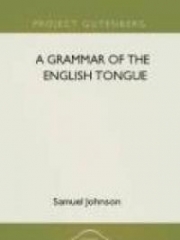 A Grammar of the English Tongue Part 13
A Grammar of the English Tongue Part 13
Diogenes surly and proud. Dr. Pope.
When present, we love, and when absent agree, I think not of iris, nor iris of me. Dryden.
These measures are varied by many combinations, and sometimes by double endings, either with or without rhyme, as in the heroick measure.
'Tis the divinity that stirs within us, 'Tis heaven itself that points out an hereafter, And intimates eternity to man. Addison.
So in that of eight syllables,
They neither added nor confounded, They neither wanted nor abounded. Prior.
In that of seven,
For resistance I could fear none, But with twenty ships had done, What thou, brave and happy Vernon, Hast atchiev'd with six alone. Glover.
In that of six,
'Twas when the seas were roaring, With hollow blasts of wind, A damsel lay deploring, All on a rock reclin'd. Gay.
In the anapestick,
When terrible tempests a.s.sail us.
And mountainous billows affright, Nor power nor wealth can avail us, But skilful industry steers right. Ballad.
To these measures and their laws, may be reduced every species of English verse.
Our versification admits of few licences, except a synalpha, or elision of e in the before a vowel, as th' eternal; and more rarely of o in to, as t'
accept; and a synaresis, by which two short vowels coalesce into one syllable, as question, special; or a word is contracted by the expulsion of a short vowel before a liquid, as av'rice, temp'rance.
Thus have I collected rules and examples, by which the English language may be learned, if the reader be already acquainted with grammatical terms, or taught by a master to those that are more ignorant. To have written a grammar for such as are not yet initiated in the schools, would have been tedious, and perhaps at last ineffectual.